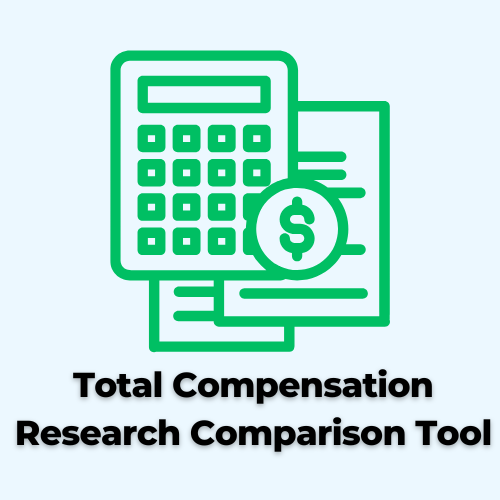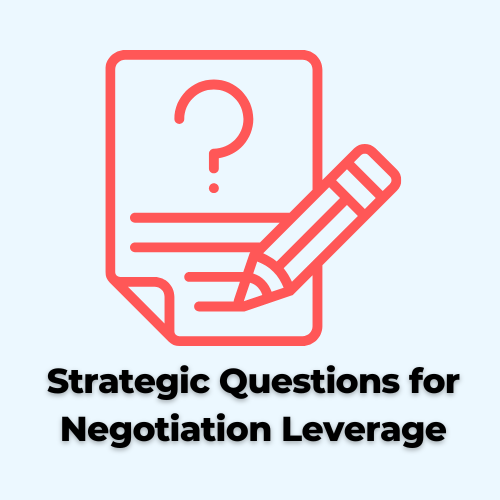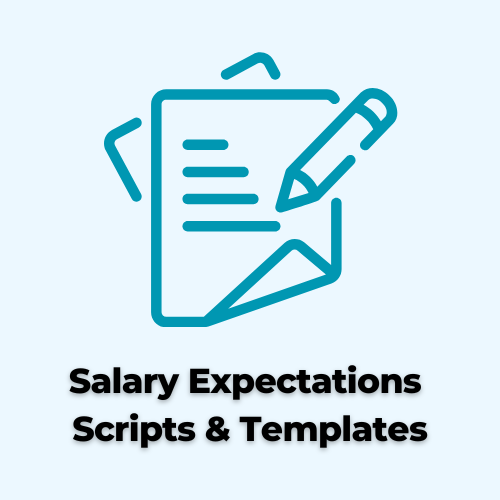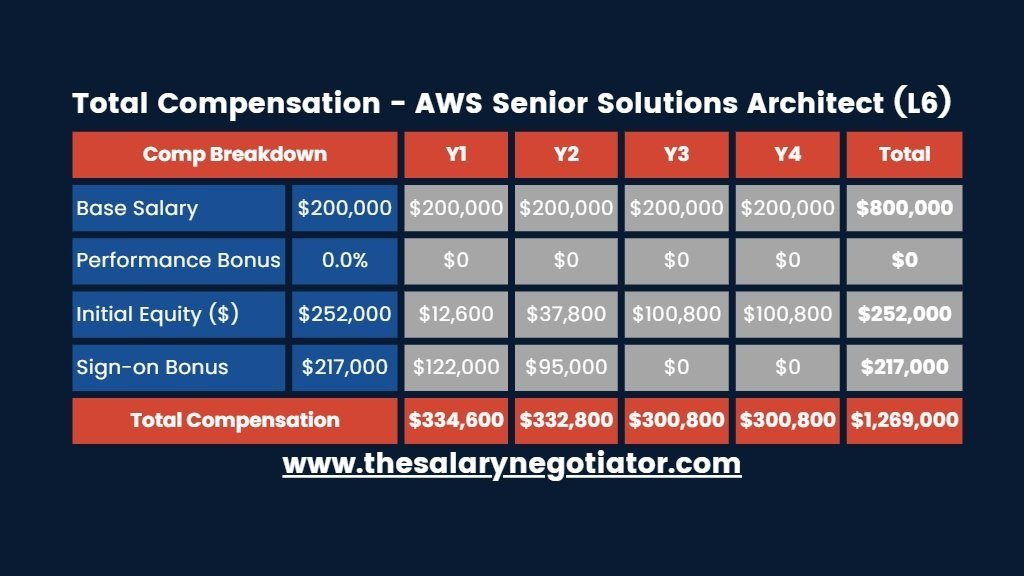Solution Architect Salary Negotiation: How To Negotiate a Solution Architect Job Offer
If you’ve received a solution architect job offer, congratulations! However, before you go ahead and accept your offer, you need to first consider negotiating for better compensation. As someone skilled at solving complex technical problems, navigating the negotiation process should be simple—so long as you have the right strategies and insights at your disposal.
Even though solution architecture jobs are known for their competitive salaries, it is still well worth your time and effort to negotiate for higher compensation. Doing so will help you increase your total career earnings and will ensure you are adequately compensated for the value you bring to your role.
So where should you begin?
In this article, we will share with you our strategies for effectively negotiating a solution architect job offer. From breaking down each of the components in your compensation package to explaining how to create an appropriate counteroffer, we will walk you through every step of the negotiation process—sharing both what to do and what not to do.
In addition to our help with software engineer and program manager salary negotiations, we’ve had great success helping solution architects negotiate job offers in all industries.
Want to Negotiate Your Offer? Get offer-specific guidance from a Salary Negotiation Coach. We help solution architects negotiate competitive job offers.
Or leverage our Salary Negotiation Courses and Salary Negotiation Templates.
 Job Offer Negotiation Course
Job Offer Negotiation Course
- Get our job offer negotiation strategies, templates, scripts, and guidance.
- Access our step-by-step lessons, compensation research guides, and tools.
- Access Now
 Raise Negotiation Course
Raise Negotiation Course
- Get our raise negotiation strategies, templates, scripts, and guidance.
- Access our step-by-step lessons, compensation research guides, and tools.
- Access Now
Understanding the Compensation Components of a Solution Architect Job Offer
As you know, jobs in solution architecture are competitive. So no matter if you’ve been offered a entry level solution architect position or a senior one, your compensation should reflect your highly valuable skill set that makes salaries in solution architecture so competitive.
Even if you think your initial offer is an excellent one, you can’t truly know its value until you break down exactly what’s included in your total compensation package.
After receiving a job offer in solution architecture, you might make the mistake of only considering the base salary being offered. However, your total yearly compensation as a solution architect will consist of various components that each need to be analyzed. In the tech industry particularly, these components will include things like a sign-on bonus, an initial equity package, an annual performance bonus, and other benefits like the option to work remotely.
Don’t make the mistake of only focusing on the base salary of your solution architect job offer and miss out on negotiating all the other elements of your compensation package. Once you have a firm understanding of these different components, you’ll be positioned for a successful negotiation.
For example, here is what an AWS Solutions Architect salary might look like in their initial offer:
Amazon Solutions Architect Salary
Now let’s spend some time going over the different components of a solution architect compensation package.
SOLUTION ARCHITECT BASE SALARY
The first and main component of your job offer will be your solution architect base salary. In any job, a base salary is the fixed guaranteed pay you receive in exchange for the work you do. Unlike some other compensation components, your base salary is not tied to your performance or the company’s.
Each level of solution architecture will have different base pay ranges associated with them that have set minimum and maximum amounts. This means that your solution architect base salary will fall anywhere between the minimum and maximum amounts that have been predetermined for your specific role. For example, the pay bands for a senior solution architect salary will be different from that for a cloud solution architect salary at the same company, and the pay would differ between companies (i.e., a Google solutions architect salary will differ from an Amazon solutions architect salary).
Even though jobs in solution architecture are competitive, it’s important to recognize that initial offers rarely come in at the top of their pay ranges. If you take the time to identify the pay range for your specific role, you’ll have a much better chance of successfully negotiating to the top end of that band.
SOLUTION ARCHITECT PERFORMANCE BONUS
Many compensation packages will also include an annual performance bonus. An annual solution architect performance bonus is generally a percentage of your base salary that’s dependent on both company and personal performance.
This means that your performance bonus could increase or decrease depending on the targets you or your company hit. While it is possible in some cases to exceed the target percentages if you and your company outperform your goals, you should assume the average bonus payout when evaluating this aspect of your job offer.
The good news is that a solution architect performance bonus can make a huge difference in your total yearly compensation. It’s important to note that for most companies these bonuses are generally non-negotiable and the set target percentage for each role type and level cannot be changed. However, don’t forget that you can negotiate your solution architect base salary. And since your performance bonus is typically a percentage of your base salary, the higher you negotiate your base salary, the higher your bonus could be.
SOLUTION ARCHITECT EQUITY PACKAGES
The next element of your compensation package to consider is your equity package. Solution architect equity packages are generally highly sought-after in these types of roles.
As a solution architect, you may receive an initial equity grant in your job offer. This equity can be offered either as RSUs (restricted stock units or restricted stock awards) or stock options. This grant will include a bundle of shares or options that vest over a defined timeframe (i.e., four years), called a vesting schedule.
While these equity packages are most common in job offers from tech companies, we’ve found that many startups and non-tech public companies are beginning to offer them in their compensation packages as well.
While solution architect equity packages can be an extremely valuable form of compensation, it’s important to remember that the value of this element does fluctuate based on the market value of the company you work for. For example, say you secure a job offer with Microsoft—you’ll benefit if Microsoft’s share value goes up, but you’ll take a loss if Microsoft’s share value goes down. Unfortunately, these fluctuations aren’t controllable. And remember: if you leave the company before the equity vests, you risk forgoing it all together.
Fortunately, we’ve found over the years that equity packages are usually a negotiable aspect of a compensation package for solution architects. So even though we suggest to always push for more equity, we also encourage you to focus on all the other compensation components too so that you have the best chance of reaching the top end of your total compensation pay band.
SOLUTION ARCHITECT SIGN-ON BONUS
Even though it may take some negotiating, solution architects will receive a sign-on bonus in most job offers. A solution architect sign-on bonus is a one-time bonus that is an incentive to join the company and that can also cover any lost bonuses or unvested equity that you gave up at your previous job.
Knowing how to negotiate for sign-on bonuses is important since not all companies provide them in their initial offers. Fortunately, we’ve had countless successes securing valuable solution architect sign-on bonuses, so we know it’s possible to negotiate for them. Even if you’re not walking away from money at your current company, you should still negotiate for a sign-on bonus because of their incredible value.
How do sign-on bonuses work? Most solution architect signing bonuses are paid in one lump sum within the first 30 days of employment. However, if you depart from the company within your first year (or other designated timeframe), you’ll typically have to pay the bonus back. It’s also important to note that not all companies approach sign-on bonuses the same: Amazon, for example, is known to offer sign-on bonuses in year one and year two—which can be paid out monthly instead of in one lump sum payment.
SOLUTION ARCHITECT EQUITY REFRESHER
An additional compensation component to consider is the solution architect equity refresher. While it’s possible to receive an equity refresher (more stock) in an initial offer for a solution architecture role, it’s more likely that the recruiter will try to withhold the stock refresher details. This practice is common for equity refreshers at Apple and other industries that offer this annual perk.
When negotiating your offer, we suggest that you ask the hiring team to provide more details about the amount and timeline of the stock refresher. However, because many hiring teams try to avoid sharing these specific details, it’s difficult to compare this benefit across different solution architecture job offers (which is why we don’t include this component in our total compensation calculation).
BENEFITS AND PERKS FOR SOLUTION ARCHITECTS
Different companies offer a wide variety of benefits and perks for solution architect roles. These benefits include things like retirement plans, healthcare packages, on-site gyms, and even childcare.
The option to work remotely has become a huge benefit that should be brought up during the interview process. However, most other benefits and perks for solution architects are typically non-negotiable. With that being said, it is sometimes possible to get changes approved via an under-the-table agreement with your future hiring manager (i.e., your manager will let you take more time off).
Five Key Steps to Negotiate a Solution Architect Job Offer
Now that we’ve gone over the different elements of a solution architect job offer, it’s time to explain how you can use these insights to negotiate for a higher total compensation.
Our years of experience helping hundreds of career professionals negotiate their job offers successfully has taught us that it’s best to avoid starting the salary negotiation process until you’ve received an actual offer. Why? Because having an offer in hand gives you more negotiation leverage and you won’t risk making the mistake of disclosing your salary expectations too early to the recruiter.
In the steps below, we’ve included our tried-and-true strategies to negotiate a solution architect job offer once you’ve received the good news from the recruiter. While these are the key steps to a solution architect salary negotiation, we strongly recommend solution architects work with a Salary Negotiation Coach to guarantee success and get all of our strategies.
1) UNDERSTAND THE COMPONENTS OF YOUR SOLUTION ARCHITECT JOB OFFER
This first step should be an easy one since we’ve covered it already.
As a quick refresher, make sure that you understand each of the components of your solution architect compensation and how they work—including your base salary, performance bonus, initial equity grant, sign-on bonus, and perks and benefits. Having a firm grasp on these different elements of your total compensation is an essential step before negotiating any job offer.

- Understand Total Compensation – Use our tool to break down and calculate the compensation in your job offer.
- Research & Compare Offers – Organize your compensation research and determine the right counter amount.
- Get Here
2) COMPLETE DUE DILIGENCE ON YOUR SOLUTION ARCHITECT JOB OFFER BY ASKING THE RIGHT QUESTIONS
When negotiating, it’s important to ask strategic questions so that you can establish an effective solution architect counteroffer.
Asking the right questions shows the recruiting team that you are seriously invested in learning more about the role and it also helps you get clarity on items that the recruiter may have been vague about (i.e., What is the expected equity refresher each year for this role?).
Don’t make the mistake of assuming you don’t need to ask any questions because you already understand everything you need to know about the offer. Asking for even more information only strengthens your counteroffer. If you’re struggling with coming up with questions to ask, you can use our list of Strategic Questions to Build Negotiation Leverage. We recommend asking questions immediately after you receive your initial offer.

- Build Negotiation Leverage – Ask the right questions to strengthen your negotiation before sending a counter.
- Email & Phone Scripts – Get our list of questions to ask and what to say if the recruiter wants to chat through them.
- Get Here
3) RESEARCH TO IDENTIFY WHAT SOLUTION ARCHITECT COMPENSATION SHOULD LOOK LIKE
Since the compensation for solution architects will look different across various companies, you need to spend time researching solution architect pay ranges, how strong your current offer is, and how much you should counter for.
Make sure that your research is specific to your role type and level (i.e., is it an entry level solution architect role or a senior solution architect role) and location (including whether it is in-person, hybrid, or remote).
PayScale or Comparably are just two examples of the multiple online resources you can use to determine the appropriate solution architect salary. When using these resources, make sure to compare the pay data you find across different sites. Since pay ranges on these platforms are publicly reported by current or past employees, it’s possible that the pay they indicate may vary from what is now offered to new employees (i.e., the current employees’ total compensation is higher because the stock price appreciated, and their equity is more valuable). The compensation ranges on these pay sites might also be off if the employee didn’t correctly upload all solution architect compensation components correctly.
Never forget that whenever you accept a job offer, you’ll ultimately be expected to complete the same tasks as anyone hired for that same position—meaning you should push for at least the mid- to top-end of the total compensation range for your solution architecture role level even if your experience or background differs from someone else’s. You can use our Total Compensation Research Comparison Tool to help you with your compensation research and identify the pay ranges.

- Understand Total Compensation – Use our tool to break down and calculate the compensation in your job offer.
- Research & Compare Offers – Organize your compensation research and determine the right counter amount.
- Get Here
4) SEND A SOLUTION ARCHITECT COUNTEROFFER TO THE RECRUITER
Once you’ve completed the first three steps of preparing for your salary negotiation, you should be ready to officially send over a solution architect counteroffer.
To start the process, you’ll present your counteroffer to the recruiter by referencing the research you’ve done on pay ranges and how the benefits being offered differ from other companies and/or your current role. We strongly recommend presenting your salary counter over email instead of by phone. Presenting your new ask in an email allows you to draft exactly what you want to say in a thoughtful manner while also ensuring you have everything in writing. An email also gives the recruiter something they can forward on and use internally to secure you a better offer.
Make sure to always approach this step professionally and kindly. Remember: this is your first opportunity to showcase what it would be like to work with you. To ensure proper communication, use our Counteroffer Drafts for examples to help you formulate a strategic counteroffer.

- Proven Counteroffer Templates – Built from hundreds of successful job offer negotiations.
- Negotiate with Confidence – Remove the guesswork with our professionally crafted counteroffers.
- Get Here
5) HANDLE ANY OBJECTIONS AND KNOW YOU ACHIEVED THE BEST SOLUTION ARCHITECT SALARY
While it sometimes only takes one solution architect counteroffer to receive an updated compensation package, it’s more likely that the hiring team will return with a list of reasons as to why they can’t make any increases to your salary.
If this happens, it’s important to stay calm and respond kindly; you should communicate that you understand their constraints, but that you would appreciate it if they could take your thoughts back to their team for one last look at the offer just like we share in our Objection Handling Scripts. Even if they insist their team will just say no, you should still ask that they at least take back your concerns and share with their team.

- Overcome Recruiter Pushback – Proven scripts to handle pushback and keep your salary negotiation on track.
- Communicate Effectively – Use expert responses to get recruiters to advocate for you with the compensation team.
- Get Here
Once they agree to take it back to their team, they usually will return with a better offer.
If you receive an updated solution architect job offer that meets your expectations and falls appropriately within the solution architect pay bands you researched, you should be ready to send an offer acceptance email. Congratulations on your successful solution architect offer negotiation!

- Accept or Decline – Expert crafted job offer acceptance email and rejection email templates to share your decision.
- Professional & Genuine Tone – These help you communicate in a professional manner regardless of what you decide.
- Get Here
Mistakes to Avoid During Your Solution Architect Salary Negotiation
During any solution architect salary negotiation, never forget that the hiring teams are trained to get the best deal for their companies. While they probably won’t lowball you, it’s important to remember that their goal is to get you to accept without negotiating.
Since we’ve already explained what you should do during your negotiation, we thought it would be helpful to share some key things you should avoid doing as well.
AVOID SHARING SALARY EXPECTATIONS BEFORE YOU GET A JOB OFFER IN SOLUTION ARCHITECTURE
Over the years, we’ve found that sharing your salary expectations before you have an offer in hand often works against you. Why? Well, let’s take a look at how this might play out in practice.
If you happen to share a lower compensation with the hiring team than what the company could offer, they are more likely to offer you that lower compensation. Alternatively, if you share a salary expectation higher than what they could offer, they might become disinterested and choose to go with a different candidate.
It’s important to always keep in mind that the recruiters are working for the company, not you. Practically speaking, it also doesn’t make much sense to go over salary expectations before you learn more about the specific role, its compensation components, and whether those elements feel like a good fit for you. After all, you’re also interviewing them to see if this role is something you want to pursue so be sure to overcome these tactics by responding like this.

- Salary Expectation Responses – Scripts to overcome recruiter salary expectation discussions and pre offer calls.
- Avoid Lowballing Yourself – These call scripts and email templates will help you get a competitive offer.
- Get Here
DON'T BE AFRAID TO OF A SOLUTION ARCHITECT SALARY NEGOTIATION
Many people shy away from negotiating because they’re afraid they’ll end up losing out on the job offer. But here’s what we know: having helped facilitate many successful solution architect salary negotiations over many years, we have never seen a company take back a solution architect job offer because of an attempted negotiation. Don’t let salary negotiation concerns keep you from trying to negotiate for a better solution architect job offer.
BE REALISTIC BY DOING YOUR SOLUTION ARCHITECT COMPENSATION RESEARCH
Even though solution architect jobs pay well, you still want to be realistic about what compensation is both appropriate and possible for the specific role you are offered. Using your analytical solution architect skill set, you should research your role thoroughly so that you only push for compensation that the company can realistically provide.
For example, the compensation package for a solution architect would be different at a start-up or non-tech company compared to the compensation package offered during a Salesforce salary negotiation or Meta salary negotiation.
Solution Architect Salary Negotiation Coaching & Tools
Increasing a solution architect compensation requires a deep understanding of the company’s compensation philosophy and the right salary negotiation strategy. Our expert Salary Negotiation Coaching will help you navigate the solution architect salary negotiation process and secure the top end of the pay band.
Or leverage our Salary Negotiation Courses and Salary Negotiation Scripts.
 Job Offer Negotiation Course
Job Offer Negotiation Course
- Get our job offer negotiation strategies, templates, scripts, and guidance.
- Access our step-by-step lessons, compensation research guides, and tools.
- Access Now
 Raise Negotiation Course
Raise Negotiation Course
- Get our raise negotiation strategies, templates, scripts, and guidance.
- Access our step-by-step lessons, compensation research guides, and tools.
- Access Now



